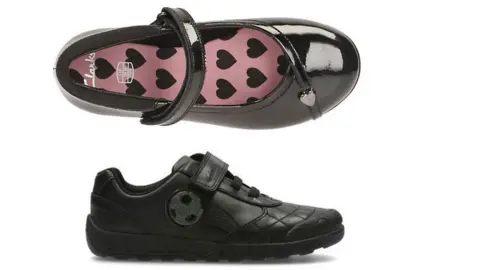Clarks in sexism row over Dolly Babe girls' shoe
 Clarks
ClarksClarks has been accused of "everyday sexism" for a calling a girls' school shoe "Dolly Babe", while the boys' equivalent is called "Leader".
The girls' shoes carry a heart-patterned insole, while the boys' insoles are decorated with footballs.
The shoe manufacturer has removed the Dolly Babe from its website following "customer feedback" about the name.
"We are working hard to ensure our ranges reflect our gender-neutral ethos," Clarks said.
"We apologise for any unintended offence caused."
However, the girls' shoe is still available online from retailers including Amazon and John Lewis and the Leader remains on sale.
Nicola Sturgeon, First Minister of Scotland, said the situation was unacceptable and "almost beyond belief" in 2017.
Allow X content?
Miranda Williams, a councillor and cabinet member for children and young people in Greenwich, southeast London, first took Clarks to task on Twitter this week.
Allow X content?
Jacob Rees-Mogg, the Conservative MP for North East Somerset, also criticised Clarks. "To call a pair of shoes for a girl Dolly Babe is dreadful. It's wrong in all sorts of ways ... this is just really silly," he told the BBC.
Carolyn Harris, shadow minister for women and equalities, described the situation as "blatant discrimination", while Sarah Ludford, a Liberal Democrat peer and shadow Brexit minister, called the name choices "depressing".
Allow X content?
Lesley Williams, a Gloucestershire councillor, tweeted that it was "offensive":
Allow X content?
Clarks said it was removing the Dolly Babe shoe, which it described as an "old and discontinued line", from its stores.
The row follows another claim of sexism levelled against Clarks earlier this month by Jemma Moonie-Dalton, who wrote a Facebook post about trying to buy school shoes for her seven-year-old daughter and five-year-old son at a Clarks store in east London.
"In the boys' section the shoes are sturdy, comfortable and weatherproof with soles clearly designed with running and climbing in mind," she wrote. "In contrast, the girls' shoes have inferior soles, are not fully covered and are not well padded at the ankle. They are not comfortable and are not suited to outdoor activities in British weather."
Clarks said it was creating more unisex shoes in response to customer feedback and promoting its gender-neutral stance both online and in store.
But Williams said Clarks had failed to learn lessons from a similar controversy last summer. In a Facebook post that went viral, Welsh mother Laura Greenwood accused Clarks of making girls' shoes that are "fussy, impractical and prone to scuffing - quite unlike your sensible, practical, durable ranges designed for boys".
The row comes as the Advertising Standards Authority plans to crack down on ads that feature stereotypical gender roles.
The move, announced last month, follows complaints about adverts such as one for Aptamil baby milk formula that showed girls growing up to be ballerinas and boys becoming engineers.
